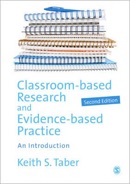Educational Research Methods

A site to support teaching and learning...
Vignettes
The following text is taken from a master’s research thesis (Taber, 1989). The Vignette offered a narrative summary of the findings of the research study. The students described in the vignette are imaginary, The field work for the research was carried out over a period of about a school year, but in the vignette data form various sources are used to construct a narrative of one student passing through the seven years of school life…
Reference: Taber, K. S. (1989). Girls' under-representation in physics classes: a case study. MSc, University of Surrey, Guildford.
This is a personal site of Keith S. Taber to support teaching of educational research methods.
(Dr Keith Taber is Professor of Science Education at the University of Cambridge.)
2017
Gill: A vignette
(The "typical" female pupil's experience of physics at the enquiry school, in comparison to a "typical" male peer.)
“In this chapter some of the findings presented previously will be drawn together, to give an overview of the enquiry results. The form this will take is of a description of the perceptions and experiences which could be ascribed to a "typical" female pupil passing through the school in comparison to her "typical" male peers. In reality all pupils are unique individuals, and probably no real girl in the school would recognise this composite report as being a precise account of her own case. However, by drawing on the various findings presented in the earlier sections of this study, it would be expected that most girls in the enquiry school would find much of the narrative familiar, with parallels in their own experiences. In order to make this chapter more readable the "typical female pupil" is referred to by the fictitious name Gill, and her "typical male peer" is given the name Barry. It should be pointed out that data was collected over the eleven to eighteen age range during a one year period of field work. It is likely that, for example, the lower school experiences of some older pupils/students are not consistent with current lower school experiences. Schools are always undergoing change and this narrative is a composite across time, as well as across a range of individual pupils.
General experiences in science lessons.
Attitudes and perceptions on entering the school.
First year experiences of science.
Comment on the ethics of this type of research writing

